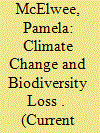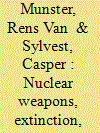|
|
|
Sort Order |
|
|
|
Items / Page
|
|
|
|
|
|
|
| Srl | Item |
| 1 |
ID:
181525


|
|
|
|
|
| Summary/Abstract |
While often treated separately, biodiversity loss and climate change are related and mutually reinforcing problems. Rising temperatures and other climate impacts have seriously altered the composition, function, and structure of many ecosystems and species, some irreversibly. Policies to tackle both problems are clearly needed, but siloed approaches continue to dominate proposed solutions. There are also risks that some climate policies, such as the expansion of afforestation or bioenergy, will have increasingly negative risks on biodiversity. Integrated, innovative, and urgent solutions are needed in order to fulfill increasing calls for transformative change in how we live with nature.
|
|
|
|
|
|
|
|
|
|
|
|
|
|
|
|
| 2 |
ID:
179325


|
|
|
|
|
| Summary/Abstract |
In the Anthropocene, International Relations must confront the possibility of anthropogenic extinction. Recent, insightful attempts to advance new vocabularies of planet politics tend to demote the profound historical and intellectual links between our current predicament and the nuclear age. In contrast, we argue that it is vital to revisit the nuclear-environment nexus of the Cold War to trace genealogies of today's intricate constellation of security problems. We do so by reappraising the work of Jonathan Schell (1943–2014), author of The Fate of the Earth (1982), who came to regard extinction as a defining feature of the nuclear age. We show how a deep engagement with nuclear weapons led Schell to an understanding of the Earth as a complex, delicate ecology and fed into a sophisticated, Arendtian theory of extinction. Despite its limitations and tensions, we argue that Schell's work remains deeply relevant for rethinking human–Earth relations and confronting the Anthropocene.
|
|
|
|
|
|
|
|
|
|
|
|
|
|
|
|
| 3 |
ID:
145984


|
|
|
|
|
| Summary/Abstract |
Planet Politics is about rewriting and rethinking International Relations as a set of practices, both intellectual and organisational. We use the polemical and rhetorical format of the political manifesto to open a space for inter-disciplinary growth and debate, and for thinking about legal and institutional reform. We hope to begin a dialogue about both the limits of IR, and of its possibilities for forming alliances and fostering interdisciplinarity that can draw upon climate science, the environmental humanities, and progressive international law to respond to changes wrought by the Anthropocene and a changing climate.
|
|
|
|
|
|
|
|
|
|
|
|
|
|
|
|
|
|
|
|
|